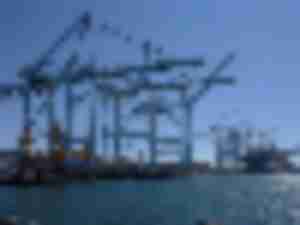Does Amazon Dominate the U.S. Supply Chain?
Book Review: “The Cost of Free Shipping: Amazon in the Global Economy” Pluto Press 2020 Hardcover $99
Seroka reports LA container volumes decline by 6% in July
Port of Los Angeles Executive Director Gene Seroka told a press conference via Zoom that the Port’s July container volumes were down by 6.11% in July 2020 at 856,389 TEUs (twenty-foot container units) compared to 912,154 TEUs in 2019.
Industry pressure mounts for government intervention in Montreal docker strikes
With an “indefinite” strike launched by 1,100 Montreal dockers now in its fourth day, pressure is mounting for the federal government to directly intervene in a lengthy waterfront labour conflict paralyzing the Port of Montreal.
Tulane University warns New Orleans and Baton Rouge at risk from sea level rise
A Tulane University report warns that as a result of increasing rates of sea level rise, the remaining 6,000 square miles of Louisiana's coastal wetlands in the Mississippi River Delta will probably disappear.
California offshore wind farm auction could begin in 2021 creating economic development for ports
Adam Stern, executive director of the Menlo Park, CA-based trade association, Offshore Wind California, told AJOT that “progress has been made in the federal approval process” conducted by the Bureau of Ocean Energy Management (BOEM) so that auctions of offshore wind sites, “may begin in 2021.”
How air cargo forwarders can adapt now to face the future
The Coronavirus pandemic has intensified pressure on forwarders to quickly adapt to meet shipper demands amid a turbulent air cargo sector. Cargoguide Managing Director Jorre Cobelens explains how online rate management platforms can offer a fast and effective way of enhancing productivity and save money.
DNV outlines a port strategy for transition to renewable energy
Det Norske Veritas (DNV), the Norwegian maritime class society, has issued a report outlining renewable energy strategies for European ports that has implications for U.S. ports.
Proposed City of Long Beach Power Authority could accelerate port wind power development
The City of Long Beach is nearing a decision on adopting a power authority model that could reduce utility rates for residents and support new investment and jobs in renewable energy that accelerate the Port of Long Beach’s Clean Air Action Plan for zero emissions.
US DOT acting to protect GPS, add more navigation signals
Transportation critically depends upon the Global Positioning System (GPS) in a wide variety of fundamental ways, according to the US Department of Transportation's (DOT) Acting Deputy Secretary. There is hardly a department mission area that is not underpinned by GPS.
OBIT: GSC’s Andy Garcia Harbor Trucking Leader & Champion of the Oakland Waterfront
Harbor trucker Andres “Andy” Garcia, owner of import drayage company GSC Logistics, died on June 24th.
© Copyright 1999–2024 American Journal of Transportation. All Rights Reserved







_-_127500_-_041215a2a6d6d37cb22e4bed67b6955febe75336_lqip.jpg)




